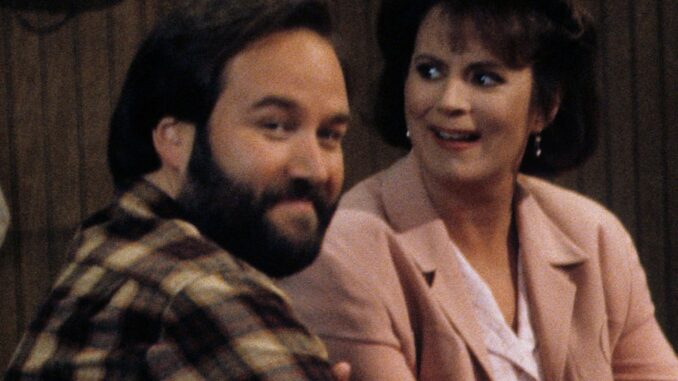
The Unseen Threads: Richard Karn's Revelation and the Alchemy of Casting Home Improvement
The familiar rev of a power tool, the guttural grunt of "more power," and the comforting, if slightly chaotic, warmth of a suburban family — Home Improvement was more than just a sitcom; it was a cultural touchstone for a generation. It presented a playful, often insightful, look at masculinity, family dynamics, and the endless quest for a bigger, better, louder life. Decades later, the show's enduring appeal lies not just in its humor or Tim Allen's charismatic lead, but in the intricate, almost magical, chemistry of its ensemble. This is why a recent revelation from Richard Karn, the beloved Al Borland, about the initial actors considered for Al and Jill Taylor, isn't just a piece of trivia; it's a tantalizing glimpse into the fragile alchemy of casting, a testament to how profoundly different choices could have irrevocably altered the show's very soul.
Imagine a different Al Borland, not the flannel-clad, mustachioed gentle giant we know. Richard Karn's Al was the unflappable anchor to Tim "The Tool Man" Taylor's boundless, often dangerous, enthusiasm. He was the straight man, the loyal friend, the quiet repository of common sense and surprising wisdom. His "Aaaarrrooo?" became as iconic as Tim's grunts. Karn imbued Al with a specific blend of earnestness, a hint of vulnerability beneath the stoic exterior, and an unwavering, almost paternal, patience for Tim's antics.
Now, consider the alternatives Karn hinted at. Perhaps a more overtly comedic actor, one known for broad physical humor or an edgier, cynical wit. An Al played by such a personality might have turned "Tool Time" into a constant battle of competing egos or an exercise in aggressive slapstick, losing the grounding, fraternal dynamic that made Tim and Al's friendship so believable. A cynic might have punctured Tim's naivete too sharply, undermining the show's inherent optimism. A performer too serious might have made Al seem dour or resentful, dissolving the warmth essential to their banter. The beauty of Karn’s Al was his genuine affection for Tim, even as he braced himself for the inevitable explosion or ludicrous suggestion. This specific, nuanced performance allowed "Tool Time" to be both uproariously funny and surprisingly heartfelt, a balance a different actor might have tipped precariously.
Equally seismic would have been a different Jill Taylor. Patricia Richardson’s Jill was the intellectual, witty, and grounded counterpoint to Tim’s primal, tool-obsessed world. She was smart, funny, occasionally exasperated, but always deeply loving. Her arguments with Tim weren't just comedic fodder; they explored genuine marital tensions, the clashes between traditional masculinity and emerging feminism, and the everyday struggles of raising three boys. Richardson brought an effervescent energy, an acerbic wit, and a palpable warmth that made Jill not just believable, but relatable and admirable. She was the show’s emotional cornerstone, holding the family, and often Tim himself, together.
Picture a Jill played by an actress known for being overly sweet or passive. The dynamic with Tim would lose its vital spark; the intellectual sparring would dwindle to polite disagreement, robbing the show of its intelligent edge. Conversely, an actress who leaned into a more overtly "nagging" or overly academic portrayal might have made Jill seem shrill or preachy, alienating audiences rather than charming them. The genius of Richardson’s performance was her ability to deliver a cutting remark with a mischievous glint in her eye, to challenge Tim while simultaneously affirming her love for him. She was a modern woman, navigating the complexities of marriage and career, and Richardson played her with an authenticity that felt pioneering for a network sitcom.
The true magic of Home Improvement, then, wasn't just the individual brilliance of Tim Allen, Richard Karn, or Patricia Richardson, but the specific, almost irreplaceable, synergy they created. Karn’s understated humor perfectly amplified Allen’s booming persona, providing a comedic rhythm that was both predictable and endlessly entertaining. Richardson’s intelligence and warmth provided the emotional backbone, grounding the show in relatable family life even amidst the loudest explosions. Had different actors, even talented ones, stepped into those roles, the entire ecosystem of the Taylor household and the "Tool Time" set would have shifted. The jokes might have landed differently, the emotional beats might have rung hollow, and the overall tone of the show, from its domestic squabbles to its philosophical ponderings, would have taken on an entirely new, potentially less resonant, hue.
Richard Karn’s revelation serves as a powerful reminder of the delicate art of casting. It highlights that the actors who ultimately bring characters to life aren't merely filling a role; they are shaping the very fabric of the narrative, infusing it with their unique energy, timing, and presence. While it's fun to speculate about the "what ifs," the true wonder lies in celebrating the "what was." For Home Improvement, the choice of Richard Karn as Al and Patricia Richardson as Jill wasn't just a good decision; it was a stroke of genius that cemented the show's place in television history, proving that some threads are simply meant to be woven together.